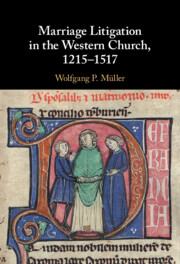Book contents
- Marriage Litigation in the Western Church, 1215−1517
- Marriage Litigation in the Western Church, 1215−1517
- Copyright page
- Contents
- Illustrations
- Acknowledgments
- Introduction
- Part I The North
- Part II The South
- Chapter 4 Italy: Canonical Marriage on the Sidelines
- Chapter 5 Top-Down Pastoral Action in Catalonia
- Chapter 6 The Domestic Partnerships of Iberia
- Conclusion
- Appendix – Sentencing in Select Diocesan Registers
- Bibliography
- Index
Chapter 6 - The Domestic Partnerships of Iberia
from Part II - The South
Published online by Cambridge University Press: 03 September 2021
- Marriage Litigation in the Western Church, 1215−1517
- Marriage Litigation in the Western Church, 1215−1517
- Copyright page
- Contents
- Illustrations
- Acknowledgments
- Introduction
- Part I The North
- Part II The South
- Chapter 4 Italy: Canonical Marriage on the Sidelines
- Chapter 5 Top-Down Pastoral Action in Catalonia
- Chapter 6 The Domestic Partnerships of Iberia
- Conclusion
- Appendix – Sentencing in Select Diocesan Registers
- Bibliography
- Index
Summary
Known references to medieval marriage litigation in the kingdom of Castile are very rare, and information about it seems most readily available in the Roman registers of the Apostolic Penitentiary. Based on this testimony, it is possible to conclude that the typology of cases handled in Castilian bishoprics did not depart from what was common experience in church tribunals of the Latin West. At the same time, ecclesiastical control over marriage formation in Castilian society was minimal, and belief in marital consent as the collective concern of families was paramount. In addition, legislation provided support for alternative forms of intimate partnership. Often introduced under the names of barragania and mancebía, they defied sacramental permanence and monogamy by legalizing relations that were temporary and non-exclusive. Local (and Aragonese) notaries also registered service contracts stipulating sexual favors for a period against payment of a dowry. They articulated obligations of cohabitation with clergy in the sacred orders and husbands to a different woman, or they recorded the consensual breakup of couples short of priestly approval. The notarial output is clearly reflective of arrangements that altogether ignored church claims to undiminished jurisdiction over the validity of spousal ties.
- Type
- Chapter
- Information
- Marriage Litigation in the Western Church, 1215–1517 , pp. 183 - 214Publisher: Cambridge University PressPrint publication year: 2021

